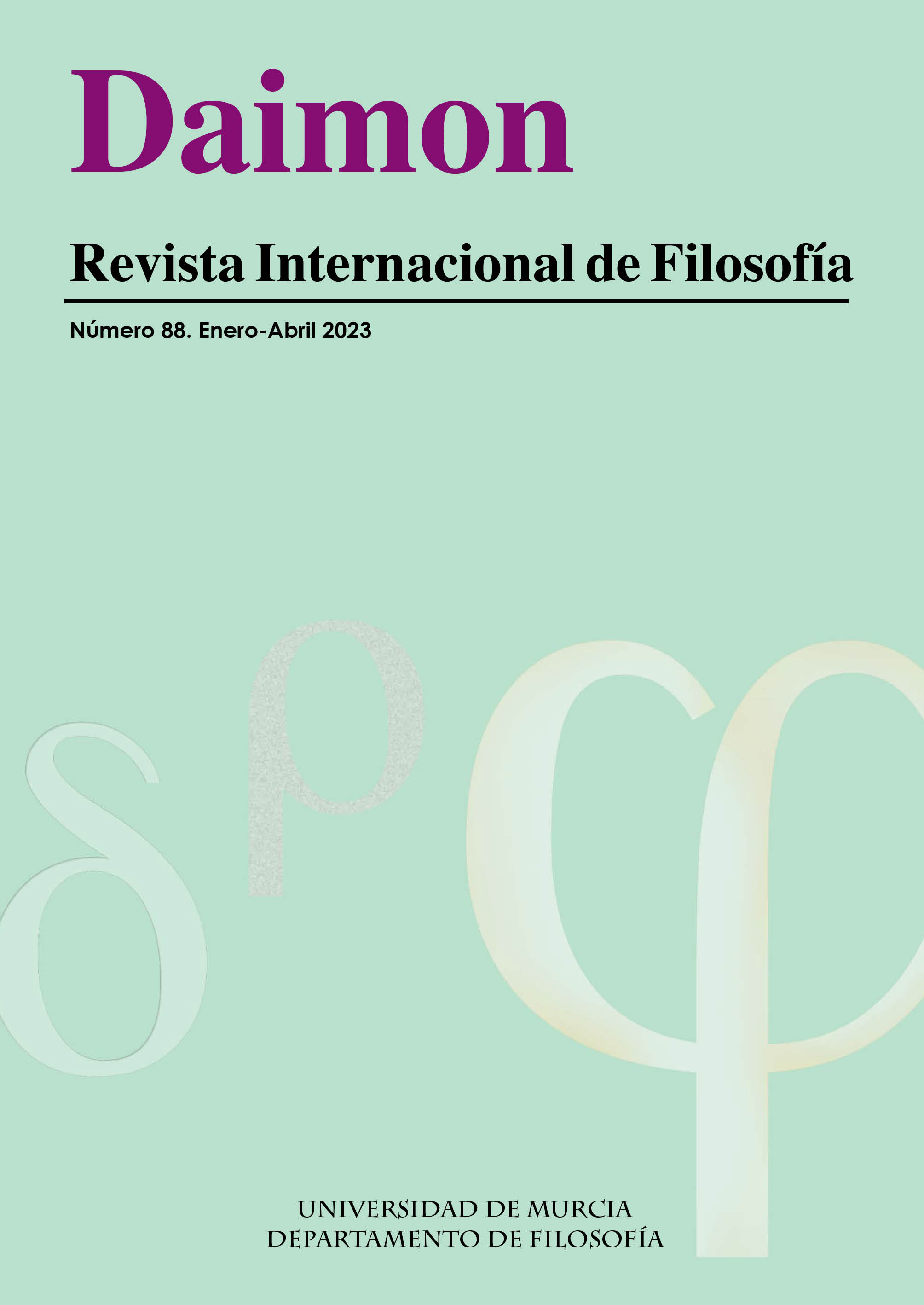Hipótesis y tener por verdadero en Kant
Resumo
En este artículo me propongo analizar dos aspectos, a menudo obviados, de la teoría kantiana del conocimiento. Se trata de la teoría del dar por verdadero y de su conexión con las hipótesis. En una primera aproximación intentaré precisar qué distingue a la opinión de otros modos de dar por verdadero como lo son el saber y la creencia. En segundo lugar, habiendo dado debida cuenta de qué son las opiniones, intentaré explicar por qué Kant considera que las hipótesis son opiniones. En tercer y último lugar, pondré de manifiesto qué entiende Kant por hipótesis y de qué tipo de inferencia tiene en mente cuando habla de éstas.
Downloads
-
Resumo633
-
PDF (Español (España))1015
-
HTML (Español (España))150
Referências
Arana, J. (1982), Ciencia y metafísica en el Kant precrítico (1746-1764), Sevilla: Universidad de Sevilla, Secretariado de Publicaciones.
Buchdahl, G. (1969), Metaphysics and the Philosophy of Science, Cambridge, Massachusets: MIT Press.
Butts, R. E. (1961) «Hypothesis and Explanation in Kant’s Philosophy of Science», Archiv für Geschichte der Philosphie, 43, pp. 153-170.
Butts, R. E. (1962), «Kant on Hypotheses in the “Doctrin of method” and the Logik», Archiv für Geschichte der Philosphie 44, pp.185-203.
Chignell, A. (2007), «Belief in Kant», Philosophical Review, vol. 116, 3, pp. 323–360.
Friedman, M. (1992), Kant and the Exact Sciences, Cambridge/Massachusets/London/England: Harvard University Press.
Friedman, M. (2012), «The Prolegomena and Natural Science», en: Lyre, H., Schliemann (eds.): Kants Prolegomena. Ein kooperativer Kommentar, Frankfurt am Main: Klostermann, 299-326.
Heidegger, M. (1987), Die Frage nach dem Ding, Tübingen: Max Niemeyer Verlag. Los textos citados provienen de la edición castellana realizada por Gómes Garcia del Valle, J. M. (2009), La pregunta por la cosa, Girona: Palamedes Editoral.
Höwning, T. (2016) «Kant on opinion, belief and knowledge», en: Höwning, T. (ed.): The highest Good in Kant’s philosophy, Berlin/New York: Walter de Gruyter, pp. 201-221.
Kant, I. (1902 y ss.). Kant’s gesammelte Schriften, Berlin: Königlich-Preußischen Akademie der Wissenschaften.
König, P. (2019), «Bedingungen der materialen Wahrheit. Zur systematischen Stellung von Kants Kritik der Urteilskraft», en: Órdenes, P., Pickhan, A. (eds.): Teleologische Reflexion in Kants Philosophie, Weisbaden: Springer, pp. 39-64.
Longuenesse, B. (2005), Kant on the human standpoint. New York: Cambridge University Press.
Mudroch, V. (2010), Kants Theorie der physikalischen Gesetze. Berlin/New York:Walter de Gruyter.
Pasternack, L. (2014), «Kant on Opinion: Assent, Hypothesis, and the Norms of General Applied Logic», Kant-Studien, vol. 105, 1, pp. 41–82.
Reyna, R. (2017), «Forma conceptual y uso hipotético de la razón. Sobre el §12 y la función de las hipótesis en la Dialéctica Trascendental», Contrastes, vol. 22, 3, pp. 108-19.
Reyna, R. (2019), «¿Por qué son –según Kant– imposibles las hipótesis en matemática?», Revista de Estudios Kantianos, vol. 4, 1, pp. 63-89.
Stevenson, L. (2003) «Opinion, Belief or Faith, and Knowledge», Kantian Review, vol. 7, no. 1, 2003, pp. 72–101.
Vaihinger, H. (1986), Die Philosophie des Als ob. System der theoretischen, praktischen und religiösen Fiktionen der Menschheit aufgrund eines idealistischen Positivismus. Aalen: Scientia Verlag.
Vigo, A. G. (2008) «Conceptos trascendentales, reflexión y juicio. Sobre el § 12 de la Kritik der reinen Vernunft», Diánoia, vol. 53, 61, pp. 73-110.
Direitos de Autor (c) 2023 Daimon

Este trabalho encontra-se publicado com aLicença Internacional Creative Commons Atribuição-NãoComercial-SemDerivações 3.0.
Las obras que se publican en esta revista están sujetas a los siguientes términos:
1. El Servicio de Publicaciones de la Universidad de Murcia (la editorial) conserva los derechos patrimoniales (copyright) de las obras publicadas, y favorece y permite la reutilización de las mismas bajo la licencia de uso indicada en el punto 2.
2. Las obras se publican en la edición electrónica de la revista bajo una licencia Creative Commons Reconocimiento-NoComercial-SinObraDerivada 3.0 España (texto legal). Se pueden copiar, usar, difundir, transmitir y exponer públicamente, siempre que: i) se cite la autoría y la fuente original de su publicación (revista, editorial y URL de la obra); ii) no se usen para fines comerciales; iii) si remezcla, transforma o crea a partir del material, no podrá distribuir el material modificado.
3. Condiciones de auto-archivo. Se permite y se anima a los autores a difundir electrónicamente las versiones pre-print (versión antes de ser evaluada) y/o post-print (versión evaluada y aceptada para su publicación) de sus obras antes de su publicación, ya que favorece su circulación y difusión más temprana y con ello un posible aumento en su citación y alcance entre la comunidad académica. Color RoMEO: verde.











